高三英语语法复习专题一:定语从句及名词性从句(共65页PPT)
文档属性
| 名称 | 高三英语语法复习专题一:定语从句及名词性从句(共65页PPT) | 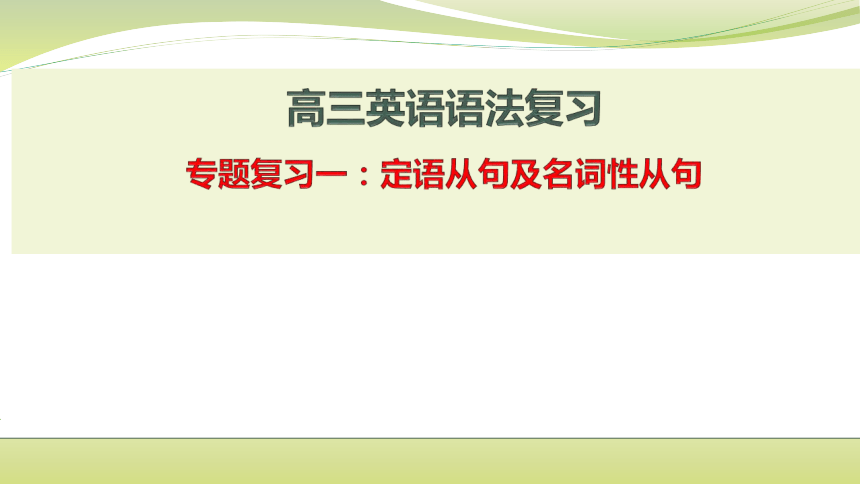 | |
| 格式 | zip | ||
| 文件大小 | 271.0KB | ||
| 资源类型 | 教案 | ||
| 版本资源 | 牛津译林版 | ||
| 科目 | 英语 | ||
| 更新时间 | 2020-03-29 22:06:20 | ||
图片预览

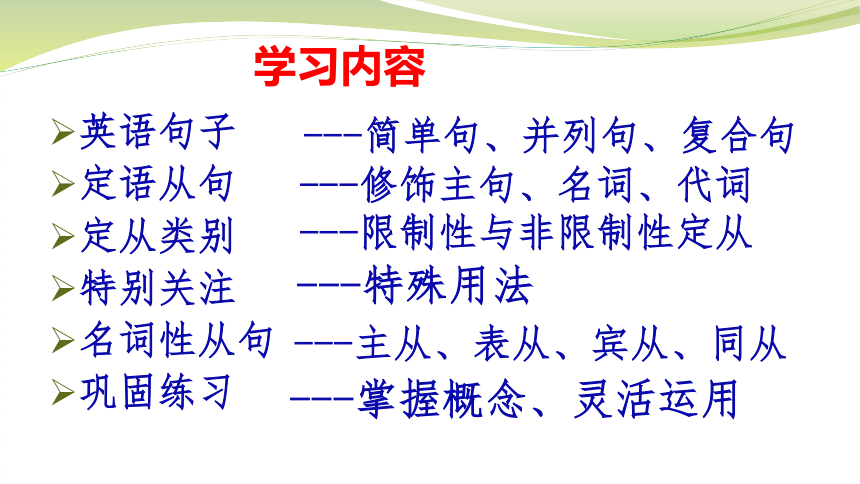
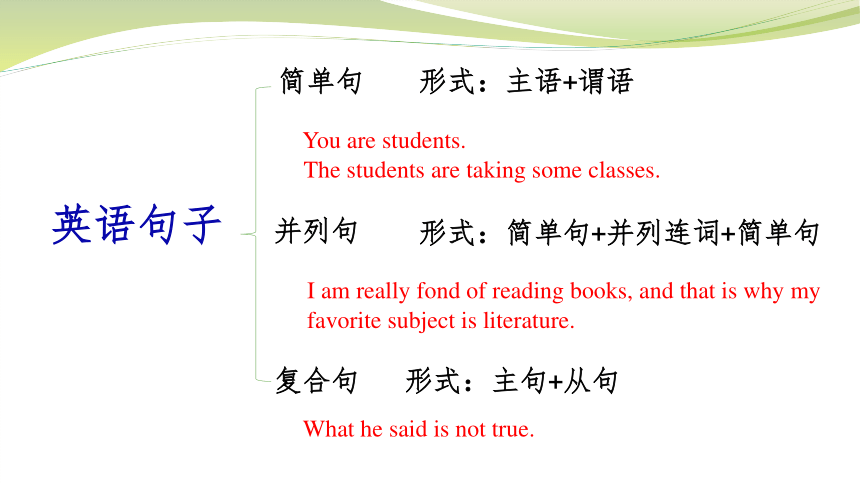
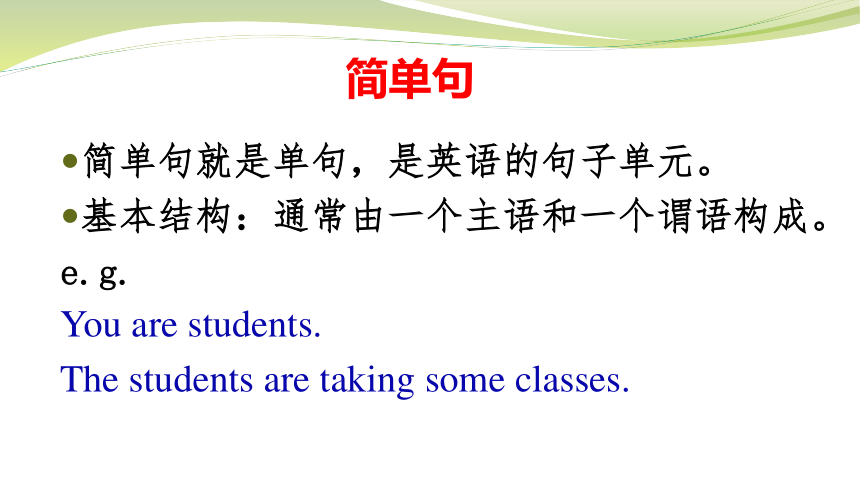
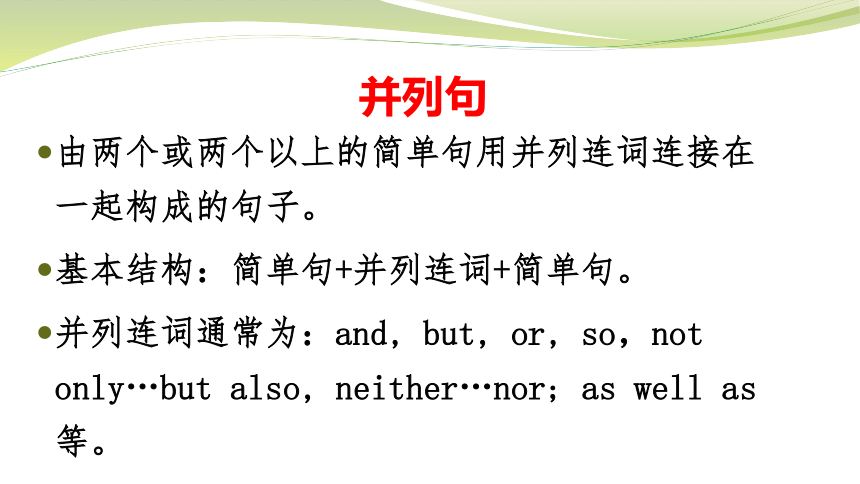
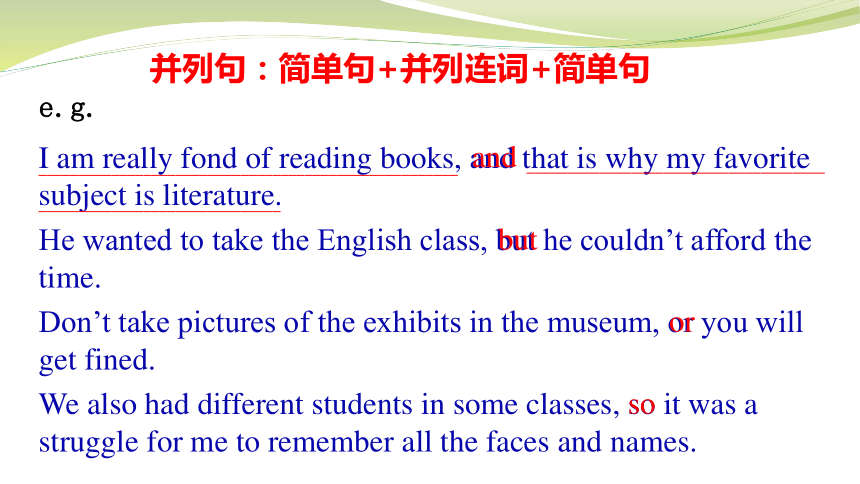
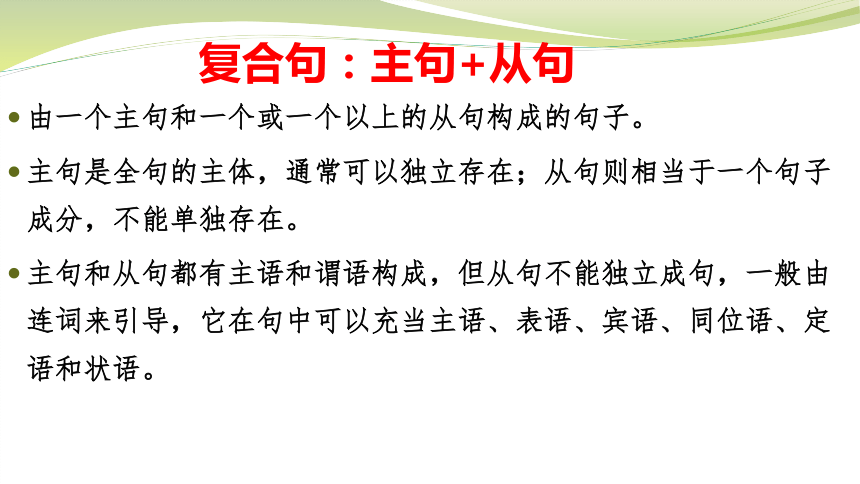
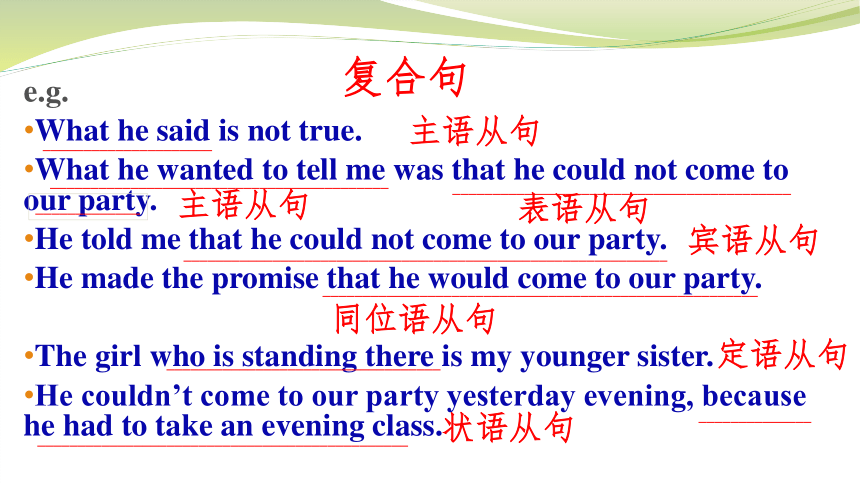
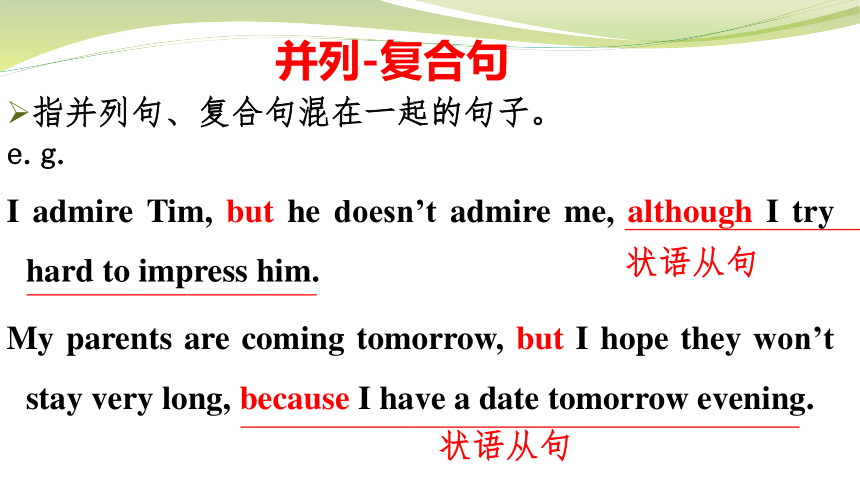
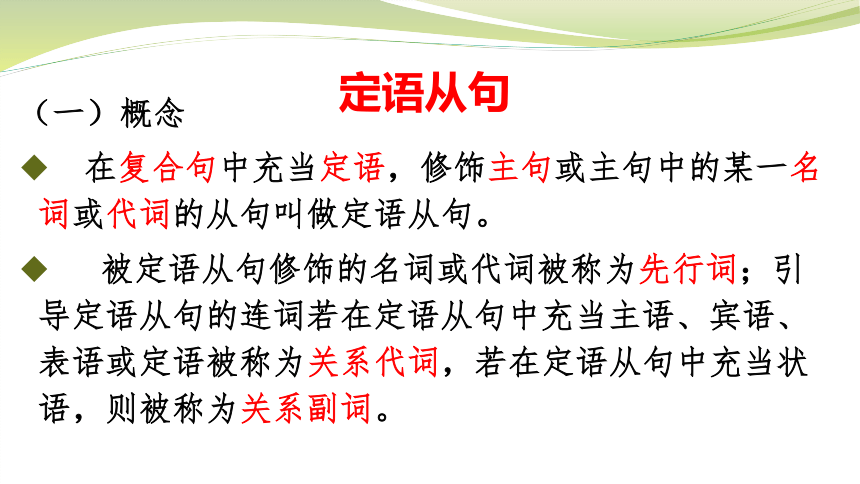
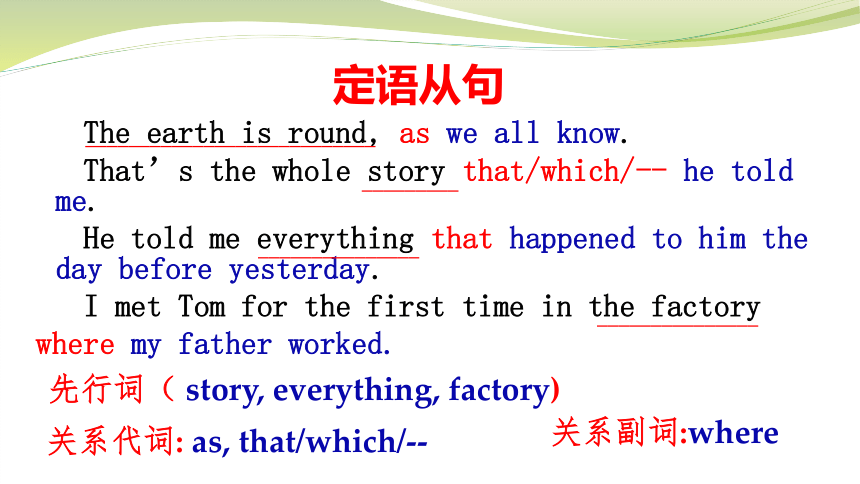
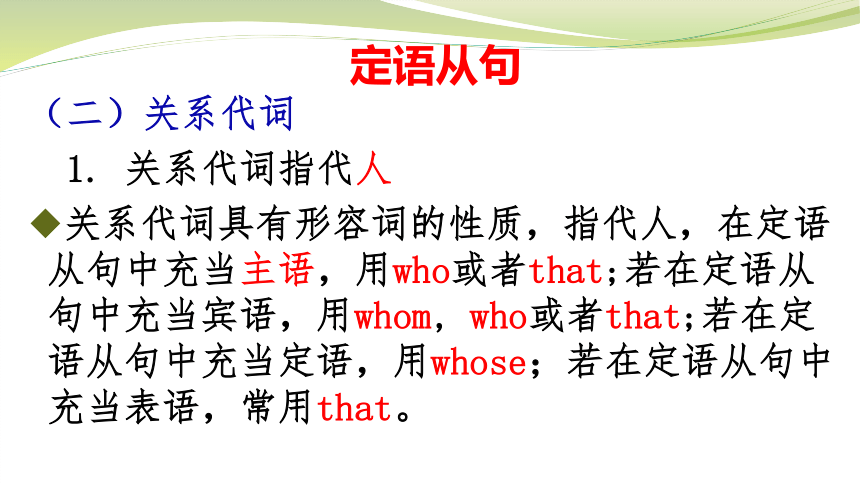
文档简介
(共65张PPT)
课时名称
高三英语语法复习
专题复习一:定语从句及名词性从句
学习内容
英语句子
定语从句
定从类别
特别关注
名词性从句
巩固练习
---简单句、并列句、复合句
---修饰主句、名词、代词
---限制性与非限制性定从
---特殊用法
---掌握概念、灵活运用
---主从、表从、宾从、同从
英语句子
简单句
复合句
并列句
形式:主语+谓语
You are students.
The students are taking some classes.
形式:简单句+并列连词+简单句
形式:主句+从句
I am really fond of reading books, and that is why my
favorite subject is literature.
What he said is not true.
简单句
简单句就是单句,是英语的句子单元。
基本结构:通常由一个主语和一个谓语构成。
e.g.
You are students.
The students are taking some classes.
并列句
由两个或两个以上的简单句用并列连词连接在一起构成的句子。
基本结构:简单句+并列连词+简单句。
并列连词通常为:and, but, or, so,not only…but also, neither…nor; as well as 等。
并列句:简单句+并列连词+简单句
e.g.
I am really fond of reading books, and that is why my favorite subject is literature.
He wanted to take the English class, but he couldn’t afford the time.
Don’t take pictures of the exhibits in the museum, or you will get fined.
We also had different students in some classes, so it was a struggle for me to remember all the faces and names.
____________________________________________________
_____________________________________
______________________________
and
but
or
so
复合句:主句+从句
由一个主句和一个或一个以上的从句构成的句子。
主句是全句的主体,通常可以独立存在;从句则相当于一个句子成分,不能单独存在。
主句和从句都有主语和谓语构成,但从句不能独立成句,一般由连词来引导,它在句中可以充当主语、表语、宾语、同位语、定语和状语。
复合句
e.g.
What he said is not true.
What he wanted to tell me was that he could not come to our party.
He told me that he could not come to our party.
He made the promise that he would come to our party.
The girl who is standing there is my younger sister.
He couldn’t come to our party yesterday evening, because he had to take an evening class.
_____________________
主语从句
__________________________________________
主语从句
__________________________________________
表语从句
____________________________________________________________
宾语从句
______________________________________________________
同位语从句
__________________________________
定语从句
______________
______________________________________________
状语从句
_____________
指并列句、复合句混在一起的句子。
e.g.
I admire Tim, but he doesn’t admire me, although I try hard to impress him.
My parents are coming tomorrow, but I hope they won’t stay very long, because I have a date tomorrow evening.
并列-复合句
___________________________
______________________
____________________________________________________
状语从句
状语从句
定语从句
?
(一)概念
在复合句中充当定语,修饰主句或主句中的某一名词或代词的从句叫做定语从句。
被定语从句修饰的名词或代词被称为先行词;引导定语从句的连词若在定语从句中充当主语、宾语、表语或定语被称为关系代词,若在定语从句中充当状语,则被称为关系副词。
The earth is round, as we all know.
That’s the whole story that/which/-- he told me.
He told me everything that happened to him the day before yesterday.
I met Tom for the first time in the factory
where my father worked.
定语从句
___________________________
_________
_______________
先行词( story, everything, factory)
_______________
关系代词: as, that/which/--
关系副词:where
定语从句
(二)关系代词
1. 关系代词指代人
关系代词具有形容词的性质,指代人,在定语从句中充当主语,用who或者that;若在定语从句中充当宾语,用whom, who或者that;若在定语从句中充当定语,用whose;若在定语从句中充当表语,常用that。
(二)关系代词 (指代人)
She was the teacher who/that taught us English literature.
She is the teacher whom/who/that we all respect.
I sat next to a girl whose name was Diana.
She is no longer the girl that she used to be.
定语从句
定语从句
2. 关系代词指代物
关系代词指物,在定语从句中充当主语或宾语,用that或者which; 若在定语从句中充当定语,用whose; 若在定语从句中充当表语,常用that。
This is the story that/which interests all of us.
The club whose membership is hard to get is very popular among the students.
Suzhou is no longer the city that it used to be.
定语从句
3. 关系代词的省略
当关系代词在定语从句中作宾语时,可以省略。
Tom is the person (whom/who/that) I want to talk to right now.
A Tale of Two Cities is the novel (which/that) I have read for more than five times.
定语从句
(三)关系副词
关系副词具有副词的性质,在定语从句中充当时间状语,用when;充当地点状语,用where,;充当原因状语,用why。
October 1st, 1949 was the date/day when the People’s Republic of China was founded.
The university where she studied is a very famous one.
The reason why he was late for school this morning was that his alarm clock didn’t go off as usual.
定语从句
(四)介词+关系代词
1. 关系代词作介词宾语
当关系代词在定语从句中充当介词宾语时,可以用介词+关系代词来连接先行词和定语从句;也可以用关系代词放先行词之后直接引导定语从句,定语从句中的介词位置保持不变, 此时,关系代词也可以省略。
定语从句
(四)介词+关系代词
1. 关系代词作介词宾语
We thought you were a person from whom we could expect help. = We thought you were a person whom/that/who/--- we could expect help from.
The money with which you were to buy a Christmas present is gone. = The money which/that/--- you were to buy a Christmas present with is gone.
定语从句
注意:关系代词作介词宾语指时间、地点和原因时,
介词+ which= when (时间)、where(地点) 或 why(原因)。
I can still remember the day on which/ when we met for the first time.
He always spends the whole day in the shop in which/ where he reads English novels.
That’s the reason for which/ why he was laid off from his job.
(四)介词+关系代词
2. 先行词way 作介词宾语
先行词way 作介词宾语时,可以用in which, that 或者把它们省略。
We had a good laugh over the strange way in which/that/ --- Matt solved the problem.
定语从句
2. 先行词way 作介词宾语
注意:若way 作先行词,且在定语从句中不充当介词宾语,则把它看作普通的先行词,定语从句关系代词的使用跟其他代词或名词充当先行词时一样。
The way that/ which is very useful for our job was provided by Robert.
I am satisfied with the way which/that/ --- he told us about.
三、限制性定语从句和非限制性定语从句
限制性定语从句是全句不可分割的一个部分,若把它去掉,句子意思便不完整;限制性定语从句和先行词之间没有逗号分开。所有引导定语从句的关系代词和关系副词都可以引导限制性定语从句。
非限制性定语从句是对所修饰的名词、代词或是整个句子作进一步的补充,若把它去掉,不会影响全句的意思。除了that以外,其他的关系代词或关系副词均可引导非限制定语从句。
Jack is the only student who/that can speak two foreign languages in our class.
We said hello to her elder brother, who is a software engineer.
The policemen is checking his goods, which are easily rotten.
He didn’t come home last night, which made his mother really worried.
限制性
非限制性
非限制性
非限制性
四、特别注意
(一)as 作关系代词
as也可用作关系代词,可以引导限制性定语从句或非限制性定语从句。
1. 用于限制性定语。
在限制性定语从句中,出现the same…或者such/so…时,定语从句中指代主语或宾语,常用as 引导定语从句。
This is the same book as I read last week.
Tom is such a cute boy as we all like.
Tom is so cute a boy as we all like.
请区别:
He is the same man that I met last night at the party.
This is the same book that I read last week.
Tom is such a cute boy that we all like him.
Tom is so cute a boy that we all like him.
同一人
同一事
结果状语从句
结果状语从句
2. 用于非限制性定语从句
As we all know, China is now the second largest economy in the world.
China is now the second largest economy in the world, as we all know.
请区别:
China is now the second largest economy in the world, which we all know.
(二)只能用that 引导定语从句的情况
1. 当先行词是all, much, little, few, everything, anything, something, nothing 等表物的不定代词时
That’s all that she has done this morning.
There’s not much that we can do about it now.
There’s nothing in the world that can discourage him from continuing his research into space.
2. 当先行词既指人又指物时
These pictures often remind me of the people and things that I came across at university.
3. 当先行词是最高级或有序数词修饰时
Suzhou is the most beautiful city that I have been to so far.
The city was so dirty and dangerous. It was the last city that I want to visit.
4. 当先行词前面有the only, the very, just the 等起强调作用的修饰词时
The book is the only one that I have right now.
This is the very book that I am looking for.
This is just the book that I am looking for.
5. 当特殊疑问句中出现疑问词which,而先行词指物时
Which is the book that you are looking for?
6. 当特殊疑问句中出现疑问词who, 而先行词指人时
Who is the guy that patted you on the shoulder?
(三)先行词+关系代词=what
Suzhou lies in the place that/which used to be the ancient Wu Kingdom.
Suzhou lies in what used to be the ancient Wu Kingdom.
Suzhou lies in the place that/which the ancient Wu Kingdom was in. =
Suzhou lies in what the ancient Wu Kingdom was in.
(四)(介词)+先行词+关系副词= where
Suzhou lies in the place in which/where the ancient Wu Kingdom was. =
Suzhou lies where the ancient Wu Kingdom was.
Tom loves his job in which/ where some calculating skills are needed.
(五)定语从句的分离现象
当定语从句太长时,为使句子保持平衡,常常把定语从句后置或同先行词分开。
The days when we used typewriters are forever gone. =
The days are forever gone when we used typewriters. =
Gone are the days when we used typewriters.
五、名词性从句
(一)概念
在主从复合句中,由一个从句来充当主语、表语、宾语或同位语,这样的句子因为具有名词的性质,统称为名词性从句。
(二)名词性从句种类
名词性从句包括主语从句、表语从句、宾语从句和同位语从句。
(三)引导词
名词性从句的引导词主要根据句子的意思来决定。 所有名词性从句表示陈述语气,用that; 若表示疑问语气,用wh-word (who, what, how, when, where, which, whether, whatever, whoever, however, wherever , whichever , etc.)。
E.g.
That he won the first place in the competition made the whole class really excited.
What he impressed me was that he could speak fluent English like an American.
Please make sure that there are no spelling and grammar mistakes in your English test.
My parents made the promise that they would travel with me to Europe. ?
Suzhou lies in what used to be Wu Kingdom.
My puzzle is how I can finish so much homework in such a short time.
Whichever team wins the semi-final will go to the national final.
?
____________________________________________________________
___________________________
___________________________________________________________________________
______________
___________________________________________________
_____________________________________
____________________________________________
____________________________________________
主语从句
主语从句
宾语从句
同位语从句
宾语从句
表语从句
主语从句
_______________________________________________________________
表语从句
注意
表语从句表示原因时,用because 来引导;表示似乎、好像时,用as if/ as though 引导。
宾语从句表示“是否”,视具体情况而定。
e.g. I am wondering if/whether he will show up tonight.
I am wondering if he will show up tonight or not.
I am wondering whether or not he will show up tonight.
I am wondering whether he will show up or not tonight.
Whether we can hold the sports meeting as scheduled depends on whether the weather will turn out fine next Thursday.
3. 区分定语从句与同位语从句
两者结构类似,都是在名词后紧跟一个从句,但定语从句的引导词必须在定语从句中充当主语或宾语,而同位语从句的引导词在从句中不充当任何成分。
I’d like to know the fact that has not been known to the public.
The fact that ancient Greek civilization had a great influence on western culture is known to many people. ?
(四) 同位语从句的后置现象(倒装)
The notice came around two in the afternoon that the meeting would be postponed until next Friday.
Nowadays, many parents are trying to either prevent their children from failure, or protect them from the knowledge that they have failed.
?
六、巩固练习
(一)判断正误,若不正确,请改正。(正确用T, 不正确用F)
( ) 1. The boy must have won the game, he looks so excited.
( ) 2. He was too careless when driving, that’s why he had the serious accident.
( ) 3. Our new English teacher loves singing English songs and dancing. She is very popular among us.
( ) 4. Though she missed the first part of the movie, but she still enjoyed it.
( ) 5. The student whom talked to me just now is one of my best friends in my class.
( ) 6. These students like the school very much, their parents have come to China for business.
( ) 7. Tina is the host of the school’s radio club, that was started two years ago.
( ) 8. Next to him stands a girl, her name is Tina.
( ) 9. Here is some information about the museum where we will visit next Saturday.
( )10. From 2000 to 2004, David studied at Oxford University, after when he went on to study at Harvard University in the US.
F
F
T
F
F
F
F
F
F
F
五、巩固练习
(一)判断正误,若不正确,请改正。(正确用T, 不正确用F)
( ) 1. The boy must have won the game, because he looks so excited.
( ) 2. He was too careless when driving, which is why he had the serious accident.
( ) 3. Our new English teacher loves singing English songs and dancing. She is very popular among us.
( ) 4. Though she missed the first part of the movie, but she still enjoyed it.
( ) 5. The student who talked to me just now is one of my best friends in my class.
( ) 6. These students like the school very much, whose parents have come to China for business.
( ) 7. Tina is the host of the school’s radio club, which was started two years ago.
( ) 8. Next to him stands a girl, whose name is Tina/ and her name is Tina.
( ) 9. Here is some information about the museum which/that/--- we will visit next Saturday.
( )10. From 2000 to 2004, David studied at Oxford University, after which he went on to study at Harvard University in the US.
/
(二) 填空: 在下列句子中填入合适的连词、关系代词或关系副词。
?
1. The new school ______________ I am attending is very large and beautiful.
2. I have a best friend ______________ name is Sally.
3. In front of the house ______________ windows face the south grow many tall trees.
4. The library is a place ______________ is a quiet and comfortable place.
5. The way ______________________ he learns French is very effective.
which/that/---
whose
whose
which/that
in which/that/---
(二) 填空: 在下列句子中填入合适的连词、关系代词或关系副词。
6. I will never forget the moment ______________ I was making a speech in front of all the schoolmates at the high school graduation ceremony.
7. He also told me the reason ______________ made me understand what had happened.
8. The writer of the article, Phillip Green, is a writer for ______________ a lot of teenagers have the greatest respect.
9. Do you still remember the evening _____________ we spent in the mountain?
10. Could you tell me about the situations _______________ this phrase can be used?
at which/when
which
whom
which/that/---
in which/where
(二) 填空: 在下列句子中填入合适的连词、关系代词或关系副词。
11. Is this museum the one ______________ you went to last Friday afternoon?
12. That was such an embarrassing experience ______________ I will remember forever.
13. That was such an embarrassing experience _______________ I will remember it forever.
14. It was at 11:30 ____________ he returned home last night.
15. It was 11:30 ______________ he returned home last night.
which/that/---
as
that
that
when
(二) 填空: 在下列句子中填入合适的连词、关系代词或关系副词。
16. This is one of the most interesting movies ______________ I have ever seen.
17. He was walking towards the window, from ______________ he could see the skyscrapers in the distance.
18. It was in the Central Park _______________ Mary met Harry for the first time.
19. It was the Central Park _______________ Mary met Harry for the first time.
20. Tom will never turn up tonight, ________________ can be inferred from what happened today.
that
where
that
in which/where
which
(三) 单项选择 Part 1
1. I’m one of the boys ________ never late for school.
A. that is B. who are C. who am D. who is
2. I’m the only one of the boys ________ never late for school.
A. that are B. who are C. who am D. who is
3. A child ________ parents are dead is called an orphan.
A. which B. his C. whose D. with
4. Read only such books ________ you can understand.
A. as B. that C. what D. than
5. We visited a factory ________ makes toys for children.
A. where B. which C. in which D. who
BDCAB
6. There is a mountain ________ the top is always covered with snow.
A. of that B. of which C. it's D. that
7. This is the only dictionary ________ he often turns to for help.
A. which B. that C. what D. one
8. The car ran over a dog and a boy ________ were just crossing the street.
A. who B. whom C. that D. which
9. My hometown is not the same ________ it used to be.
A. like B. as C. that D. which
10. I don't like ________ you speak to her.
A. the way B. the way in that C. the way which D. the way of which
BBCBA
11. The last place ____ we visited was the Great Wall.
A. which B. that C. where D. it
12. Last night we went to Ann's party, _______we enjoyed very much.
A. when B. that C. which D. where
13. Football, _______is a very interesting game, is played all over the world.
A. that B. which C. it D. who
14. Is there anything else ________ you require?
A. which B. that C. who D. what
15. He talked happily about the men and books _____ interested him greatly in the school.
A. which B. who C. when D. that
BCBBD
16. I'll tell you _______ he told me last month.
A. all which B. all what C. that all D. all
17. Please pass me the dictionary _______ cover is black.
A. which B. that C. its D. whose
18. Is this the museum _______ you visited the other day?
A. that B. where C. in which D. the one
19. --How do you like the book?--It's quite different from _______ I read last week.
A. that B. which C. the one D. the one what
20. This is the factory _______ we visited last year.
A. that B. where C. the one D. at which
DDACA
21. I’ll tell you ________ he told me last month.
A. all which B. all what C. that all D. all
22. Is this the museum ________ you visited the other day?
A. that B. where C. in which D. the one
23. Who is the man ________ is talking with John?
A. which B. who C. what D. that
24. Is this the shirt ________ he often wears?
A. whom B. whose C. what D. that
25. Is this shirt _________ that he often wears?
A. which B. the one C. what D. that
DADDB
26. I’m one of the boys _________ never late for school.
A. that is B. who are C. who am D. who is
27. This is the only dictionary ________ he often turns to for help
A. which B. that C. what D. one
28. Read only such books _________ you can understand.
A. as B. that C. what D. than
29. I don’t like _________ you speak to her.
A. the way B. the way in that C. the way which
D. the way of which
30. My hometown is not the same _________ it used to be.
A. like B. as C. that D. which
BBAAB
31. It was Johnson, ________ studied very hard, ________ often offered us help.
A. that; that B. who; which C. who; that D. that; who
32. Jim told me ________ he said so at the meeting was really true.
A. that B. all C. what D. all that
33. The boss _________ department Mr. King worked 10 years ago looked down upon women.
A. in which B. in that C. in whose D. whose
34. In the meeting-room, there are tables, ________ you can sit there reading.
A. where B. by which C. at where D. and
35. The meeting was put off , ________ was exactly ________ we wanted.
A. it; that B. as; that C. which; what D. this; what
CACDC
36. They were talking about the things and persons ________ didn’t interest me at all.
A. which B. who C. that D. what
37. In China, the number of cities is increasing ________development is recognized across the world.
A. where B. which C. whose D. that
38. Children who are not active or_______diet is high in fat will gain weight quickly.
A. what B. whose C. which D. that
39. The old temple_______roof was damaged in a storm is now under repair.
A. where B. which C. its D. whose
40. That’s the new machine_______parts are too small to be seen.
A. that B. which C. whose D. what
CCBDC
(三)单线填空 Part 2
CCDBB
CDCDC
CDDDB
BDCAB
BAADD
ADABA
BCBDD
DCADD
DDDAD
DBDAB
ACCCB
DBCBC
61. We may look at the world around us, but somehow we manage not to see it until ________ we've become used to suddenly disappears.
A. when B. where C. what D. why
62. --- Do you know ________ that prevents so many citizens from being happy?
--- I am sure low income is the main reason.
A. why is it B. what is it C. why it is D. what it is
63. In the Russian media about the Olympic ceremony, there is applause for ________ Brazil has managed to achieve on such a limited budget.
A. how B. what C. that D. when
64. The pupils in our school like reading after lunch, most of ______ seated on the grass
unless it rains.
A. them B. whom C. that D. who
65. I've come to learn that the best time to debate with family members is ________ they have food in their mouths.
A. how B. that C. whether D. when
CDBAD
66. It is on Spring Festival Eve, ________ everyone is celebrating the Chinese new year, ________ Senior 3 students in China can take a rest from their study.
A. when; that B. that; when C. when; when D. that; that
67. With private groups, there is a false sense ________ everybody in the groups knows each other and has the same interests in mind.
A. where B. that C. what D. why
68. Years may wrinkle the skin, but it is to give up enthusiasm ________ wrinkles the soul.
A. who B. which C. that D. when
69. It's strongly advised that smokers not be allowed to smoke in any room ________ babies currently occupies.
A. where B. whose C. that D. as
70. The prize winner described to the class ________ he had managed to achieve excellence in his studies.
A. if B. how C. what D. that
?
ABCCB
Wish you success!
课时名称
高三英语语法复习
专题复习一:定语从句及名词性从句
学习内容
英语句子
定语从句
定从类别
特别关注
名词性从句
巩固练习
---简单句、并列句、复合句
---修饰主句、名词、代词
---限制性与非限制性定从
---特殊用法
---掌握概念、灵活运用
---主从、表从、宾从、同从
英语句子
简单句
复合句
并列句
形式:主语+谓语
You are students.
The students are taking some classes.
形式:简单句+并列连词+简单句
形式:主句+从句
I am really fond of reading books, and that is why my
favorite subject is literature.
What he said is not true.
简单句
简单句就是单句,是英语的句子单元。
基本结构:通常由一个主语和一个谓语构成。
e.g.
You are students.
The students are taking some classes.
并列句
由两个或两个以上的简单句用并列连词连接在一起构成的句子。
基本结构:简单句+并列连词+简单句。
并列连词通常为:and, but, or, so,not only…but also, neither…nor; as well as 等。
并列句:简单句+并列连词+简单句
e.g.
I am really fond of reading books, and that is why my favorite subject is literature.
He wanted to take the English class, but he couldn’t afford the time.
Don’t take pictures of the exhibits in the museum, or you will get fined.
We also had different students in some classes, so it was a struggle for me to remember all the faces and names.
____________________________________________________
_____________________________________
______________________________
and
but
or
so
复合句:主句+从句
由一个主句和一个或一个以上的从句构成的句子。
主句是全句的主体,通常可以独立存在;从句则相当于一个句子成分,不能单独存在。
主句和从句都有主语和谓语构成,但从句不能独立成句,一般由连词来引导,它在句中可以充当主语、表语、宾语、同位语、定语和状语。
复合句
e.g.
What he said is not true.
What he wanted to tell me was that he could not come to our party.
He told me that he could not come to our party.
He made the promise that he would come to our party.
The girl who is standing there is my younger sister.
He couldn’t come to our party yesterday evening, because he had to take an evening class.
_____________________
主语从句
__________________________________________
主语从句
__________________________________________
表语从句
____________________________________________________________
宾语从句
______________________________________________________
同位语从句
__________________________________
定语从句
______________
______________________________________________
状语从句
_____________
指并列句、复合句混在一起的句子。
e.g.
I admire Tim, but he doesn’t admire me, although I try hard to impress him.
My parents are coming tomorrow, but I hope they won’t stay very long, because I have a date tomorrow evening.
并列-复合句
___________________________
______________________
____________________________________________________
状语从句
状语从句
定语从句
?
(一)概念
在复合句中充当定语,修饰主句或主句中的某一名词或代词的从句叫做定语从句。
被定语从句修饰的名词或代词被称为先行词;引导定语从句的连词若在定语从句中充当主语、宾语、表语或定语被称为关系代词,若在定语从句中充当状语,则被称为关系副词。
The earth is round, as we all know.
That’s the whole story that/which/-- he told me.
He told me everything that happened to him the day before yesterday.
I met Tom for the first time in the factory
where my father worked.
定语从句
___________________________
_________
_______________
先行词( story, everything, factory)
_______________
关系代词: as, that/which/--
关系副词:where
定语从句
(二)关系代词
1. 关系代词指代人
关系代词具有形容词的性质,指代人,在定语从句中充当主语,用who或者that;若在定语从句中充当宾语,用whom, who或者that;若在定语从句中充当定语,用whose;若在定语从句中充当表语,常用that。
(二)关系代词 (指代人)
She was the teacher who/that taught us English literature.
She is the teacher whom/who/that we all respect.
I sat next to a girl whose name was Diana.
She is no longer the girl that she used to be.
定语从句
定语从句
2. 关系代词指代物
关系代词指物,在定语从句中充当主语或宾语,用that或者which; 若在定语从句中充当定语,用whose; 若在定语从句中充当表语,常用that。
This is the story that/which interests all of us.
The club whose membership is hard to get is very popular among the students.
Suzhou is no longer the city that it used to be.
定语从句
3. 关系代词的省略
当关系代词在定语从句中作宾语时,可以省略。
Tom is the person (whom/who/that) I want to talk to right now.
A Tale of Two Cities is the novel (which/that) I have read for more than five times.
定语从句
(三)关系副词
关系副词具有副词的性质,在定语从句中充当时间状语,用when;充当地点状语,用where,;充当原因状语,用why。
October 1st, 1949 was the date/day when the People’s Republic of China was founded.
The university where she studied is a very famous one.
The reason why he was late for school this morning was that his alarm clock didn’t go off as usual.
定语从句
(四)介词+关系代词
1. 关系代词作介词宾语
当关系代词在定语从句中充当介词宾语时,可以用介词+关系代词来连接先行词和定语从句;也可以用关系代词放先行词之后直接引导定语从句,定语从句中的介词位置保持不变, 此时,关系代词也可以省略。
定语从句
(四)介词+关系代词
1. 关系代词作介词宾语
We thought you were a person from whom we could expect help. = We thought you were a person whom/that/who/--- we could expect help from.
The money with which you were to buy a Christmas present is gone. = The money which/that/--- you were to buy a Christmas present with is gone.
定语从句
注意:关系代词作介词宾语指时间、地点和原因时,
介词+ which= when (时间)、where(地点) 或 why(原因)。
I can still remember the day on which/ when we met for the first time.
He always spends the whole day in the shop in which/ where he reads English novels.
That’s the reason for which/ why he was laid off from his job.
(四)介词+关系代词
2. 先行词way 作介词宾语
先行词way 作介词宾语时,可以用in which, that 或者把它们省略。
We had a good laugh over the strange way in which/that/ --- Matt solved the problem.
定语从句
2. 先行词way 作介词宾语
注意:若way 作先行词,且在定语从句中不充当介词宾语,则把它看作普通的先行词,定语从句关系代词的使用跟其他代词或名词充当先行词时一样。
The way that/ which is very useful for our job was provided by Robert.
I am satisfied with the way which/that/ --- he told us about.
三、限制性定语从句和非限制性定语从句
限制性定语从句是全句不可分割的一个部分,若把它去掉,句子意思便不完整;限制性定语从句和先行词之间没有逗号分开。所有引导定语从句的关系代词和关系副词都可以引导限制性定语从句。
非限制性定语从句是对所修饰的名词、代词或是整个句子作进一步的补充,若把它去掉,不会影响全句的意思。除了that以外,其他的关系代词或关系副词均可引导非限制定语从句。
Jack is the only student who/that can speak two foreign languages in our class.
We said hello to her elder brother, who is a software engineer.
The policemen is checking his goods, which are easily rotten.
He didn’t come home last night, which made his mother really worried.
限制性
非限制性
非限制性
非限制性
四、特别注意
(一)as 作关系代词
as也可用作关系代词,可以引导限制性定语从句或非限制性定语从句。
1. 用于限制性定语。
在限制性定语从句中,出现the same…或者such/so…时,定语从句中指代主语或宾语,常用as 引导定语从句。
This is the same book as I read last week.
Tom is such a cute boy as we all like.
Tom is so cute a boy as we all like.
请区别:
He is the same man that I met last night at the party.
This is the same book that I read last week.
Tom is such a cute boy that we all like him.
Tom is so cute a boy that we all like him.
同一人
同一事
结果状语从句
结果状语从句
2. 用于非限制性定语从句
As we all know, China is now the second largest economy in the world.
China is now the second largest economy in the world, as we all know.
请区别:
China is now the second largest economy in the world, which we all know.
(二)只能用that 引导定语从句的情况
1. 当先行词是all, much, little, few, everything, anything, something, nothing 等表物的不定代词时
That’s all that she has done this morning.
There’s not much that we can do about it now.
There’s nothing in the world that can discourage him from continuing his research into space.
2. 当先行词既指人又指物时
These pictures often remind me of the people and things that I came across at university.
3. 当先行词是最高级或有序数词修饰时
Suzhou is the most beautiful city that I have been to so far.
The city was so dirty and dangerous. It was the last city that I want to visit.
4. 当先行词前面有the only, the very, just the 等起强调作用的修饰词时
The book is the only one that I have right now.
This is the very book that I am looking for.
This is just the book that I am looking for.
5. 当特殊疑问句中出现疑问词which,而先行词指物时
Which is the book that you are looking for?
6. 当特殊疑问句中出现疑问词who, 而先行词指人时
Who is the guy that patted you on the shoulder?
(三)先行词+关系代词=what
Suzhou lies in the place that/which used to be the ancient Wu Kingdom.
Suzhou lies in what used to be the ancient Wu Kingdom.
Suzhou lies in the place that/which the ancient Wu Kingdom was in. =
Suzhou lies in what the ancient Wu Kingdom was in.
(四)(介词)+先行词+关系副词= where
Suzhou lies in the place in which/where the ancient Wu Kingdom was. =
Suzhou lies where the ancient Wu Kingdom was.
Tom loves his job in which/ where some calculating skills are needed.
(五)定语从句的分离现象
当定语从句太长时,为使句子保持平衡,常常把定语从句后置或同先行词分开。
The days when we used typewriters are forever gone. =
The days are forever gone when we used typewriters. =
Gone are the days when we used typewriters.
五、名词性从句
(一)概念
在主从复合句中,由一个从句来充当主语、表语、宾语或同位语,这样的句子因为具有名词的性质,统称为名词性从句。
(二)名词性从句种类
名词性从句包括主语从句、表语从句、宾语从句和同位语从句。
(三)引导词
名词性从句的引导词主要根据句子的意思来决定。 所有名词性从句表示陈述语气,用that; 若表示疑问语气,用wh-word (who, what, how, when, where, which, whether, whatever, whoever, however, wherever , whichever , etc.)。
E.g.
That he won the first place in the competition made the whole class really excited.
What he impressed me was that he could speak fluent English like an American.
Please make sure that there are no spelling and grammar mistakes in your English test.
My parents made the promise that they would travel with me to Europe. ?
Suzhou lies in what used to be Wu Kingdom.
My puzzle is how I can finish so much homework in such a short time.
Whichever team wins the semi-final will go to the national final.
?
____________________________________________________________
___________________________
___________________________________________________________________________
______________
___________________________________________________
_____________________________________
____________________________________________
____________________________________________
主语从句
主语从句
宾语从句
同位语从句
宾语从句
表语从句
主语从句
_______________________________________________________________
表语从句
注意
表语从句表示原因时,用because 来引导;表示似乎、好像时,用as if/ as though 引导。
宾语从句表示“是否”,视具体情况而定。
e.g. I am wondering if/whether he will show up tonight.
I am wondering if he will show up tonight or not.
I am wondering whether or not he will show up tonight.
I am wondering whether he will show up or not tonight.
Whether we can hold the sports meeting as scheduled depends on whether the weather will turn out fine next Thursday.
3. 区分定语从句与同位语从句
两者结构类似,都是在名词后紧跟一个从句,但定语从句的引导词必须在定语从句中充当主语或宾语,而同位语从句的引导词在从句中不充当任何成分。
I’d like to know the fact that has not been known to the public.
The fact that ancient Greek civilization had a great influence on western culture is known to many people. ?
(四) 同位语从句的后置现象(倒装)
The notice came around two in the afternoon that the meeting would be postponed until next Friday.
Nowadays, many parents are trying to either prevent their children from failure, or protect them from the knowledge that they have failed.
?
六、巩固练习
(一)判断正误,若不正确,请改正。(正确用T, 不正确用F)
( ) 1. The boy must have won the game, he looks so excited.
( ) 2. He was too careless when driving, that’s why he had the serious accident.
( ) 3. Our new English teacher loves singing English songs and dancing. She is very popular among us.
( ) 4. Though she missed the first part of the movie, but she still enjoyed it.
( ) 5. The student whom talked to me just now is one of my best friends in my class.
( ) 6. These students like the school very much, their parents have come to China for business.
( ) 7. Tina is the host of the school’s radio club, that was started two years ago.
( ) 8. Next to him stands a girl, her name is Tina.
( ) 9. Here is some information about the museum where we will visit next Saturday.
( )10. From 2000 to 2004, David studied at Oxford University, after when he went on to study at Harvard University in the US.
F
F
T
F
F
F
F
F
F
F
五、巩固练习
(一)判断正误,若不正确,请改正。(正确用T, 不正确用F)
( ) 1. The boy must have won the game, because he looks so excited.
( ) 2. He was too careless when driving, which is why he had the serious accident.
( ) 3. Our new English teacher loves singing English songs and dancing. She is very popular among us.
( ) 4. Though she missed the first part of the movie, but she still enjoyed it.
( ) 5. The student who talked to me just now is one of my best friends in my class.
( ) 6. These students like the school very much, whose parents have come to China for business.
( ) 7. Tina is the host of the school’s radio club, which was started two years ago.
( ) 8. Next to him stands a girl, whose name is Tina/ and her name is Tina.
( ) 9. Here is some information about the museum which/that/--- we will visit next Saturday.
( )10. From 2000 to 2004, David studied at Oxford University, after which he went on to study at Harvard University in the US.
/
(二) 填空: 在下列句子中填入合适的连词、关系代词或关系副词。
?
1. The new school ______________ I am attending is very large and beautiful.
2. I have a best friend ______________ name is Sally.
3. In front of the house ______________ windows face the south grow many tall trees.
4. The library is a place ______________ is a quiet and comfortable place.
5. The way ______________________ he learns French is very effective.
which/that/---
whose
whose
which/that
in which/that/---
(二) 填空: 在下列句子中填入合适的连词、关系代词或关系副词。
6. I will never forget the moment ______________ I was making a speech in front of all the schoolmates at the high school graduation ceremony.
7. He also told me the reason ______________ made me understand what had happened.
8. The writer of the article, Phillip Green, is a writer for ______________ a lot of teenagers have the greatest respect.
9. Do you still remember the evening _____________ we spent in the mountain?
10. Could you tell me about the situations _______________ this phrase can be used?
at which/when
which
whom
which/that/---
in which/where
(二) 填空: 在下列句子中填入合适的连词、关系代词或关系副词。
11. Is this museum the one ______________ you went to last Friday afternoon?
12. That was such an embarrassing experience ______________ I will remember forever.
13. That was such an embarrassing experience _______________ I will remember it forever.
14. It was at 11:30 ____________ he returned home last night.
15. It was 11:30 ______________ he returned home last night.
which/that/---
as
that
that
when
(二) 填空: 在下列句子中填入合适的连词、关系代词或关系副词。
16. This is one of the most interesting movies ______________ I have ever seen.
17. He was walking towards the window, from ______________ he could see the skyscrapers in the distance.
18. It was in the Central Park _______________ Mary met Harry for the first time.
19. It was the Central Park _______________ Mary met Harry for the first time.
20. Tom will never turn up tonight, ________________ can be inferred from what happened today.
that
where
that
in which/where
which
(三) 单项选择 Part 1
1. I’m one of the boys ________ never late for school.
A. that is B. who are C. who am D. who is
2. I’m the only one of the boys ________ never late for school.
A. that are B. who are C. who am D. who is
3. A child ________ parents are dead is called an orphan.
A. which B. his C. whose D. with
4. Read only such books ________ you can understand.
A. as B. that C. what D. than
5. We visited a factory ________ makes toys for children.
A. where B. which C. in which D. who
BDCAB
6. There is a mountain ________ the top is always covered with snow.
A. of that B. of which C. it's D. that
7. This is the only dictionary ________ he often turns to for help.
A. which B. that C. what D. one
8. The car ran over a dog and a boy ________ were just crossing the street.
A. who B. whom C. that D. which
9. My hometown is not the same ________ it used to be.
A. like B. as C. that D. which
10. I don't like ________ you speak to her.
A. the way B. the way in that C. the way which D. the way of which
BBCBA
11. The last place ____ we visited was the Great Wall.
A. which B. that C. where D. it
12. Last night we went to Ann's party, _______we enjoyed very much.
A. when B. that C. which D. where
13. Football, _______is a very interesting game, is played all over the world.
A. that B. which C. it D. who
14. Is there anything else ________ you require?
A. which B. that C. who D. what
15. He talked happily about the men and books _____ interested him greatly in the school.
A. which B. who C. when D. that
BCBBD
16. I'll tell you _______ he told me last month.
A. all which B. all what C. that all D. all
17. Please pass me the dictionary _______ cover is black.
A. which B. that C. its D. whose
18. Is this the museum _______ you visited the other day?
A. that B. where C. in which D. the one
19. --How do you like the book?--It's quite different from _______ I read last week.
A. that B. which C. the one D. the one what
20. This is the factory _______ we visited last year.
A. that B. where C. the one D. at which
DDACA
21. I’ll tell you ________ he told me last month.
A. all which B. all what C. that all D. all
22. Is this the museum ________ you visited the other day?
A. that B. where C. in which D. the one
23. Who is the man ________ is talking with John?
A. which B. who C. what D. that
24. Is this the shirt ________ he often wears?
A. whom B. whose C. what D. that
25. Is this shirt _________ that he often wears?
A. which B. the one C. what D. that
DADDB
26. I’m one of the boys _________ never late for school.
A. that is B. who are C. who am D. who is
27. This is the only dictionary ________ he often turns to for help
A. which B. that C. what D. one
28. Read only such books _________ you can understand.
A. as B. that C. what D. than
29. I don’t like _________ you speak to her.
A. the way B. the way in that C. the way which
D. the way of which
30. My hometown is not the same _________ it used to be.
A. like B. as C. that D. which
BBAAB
31. It was Johnson, ________ studied very hard, ________ often offered us help.
A. that; that B. who; which C. who; that D. that; who
32. Jim told me ________ he said so at the meeting was really true.
A. that B. all C. what D. all that
33. The boss _________ department Mr. King worked 10 years ago looked down upon women.
A. in which B. in that C. in whose D. whose
34. In the meeting-room, there are tables, ________ you can sit there reading.
A. where B. by which C. at where D. and
35. The meeting was put off , ________ was exactly ________ we wanted.
A. it; that B. as; that C. which; what D. this; what
CACDC
36. They were talking about the things and persons ________ didn’t interest me at all.
A. which B. who C. that D. what
37. In China, the number of cities is increasing ________development is recognized across the world.
A. where B. which C. whose D. that
38. Children who are not active or_______diet is high in fat will gain weight quickly.
A. what B. whose C. which D. that
39. The old temple_______roof was damaged in a storm is now under repair.
A. where B. which C. its D. whose
40. That’s the new machine_______parts are too small to be seen.
A. that B. which C. whose D. what
CCBDC
(三)单线填空 Part 2
CCDBB
CDCDC
CDDDB
BDCAB
BAADD
ADABA
BCBDD
DCADD
DDDAD
DBDAB
ACCCB
DBCBC
61. We may look at the world around us, but somehow we manage not to see it until ________ we've become used to suddenly disappears.
A. when B. where C. what D. why
62. --- Do you know ________ that prevents so many citizens from being happy?
--- I am sure low income is the main reason.
A. why is it B. what is it C. why it is D. what it is
63. In the Russian media about the Olympic ceremony, there is applause for ________ Brazil has managed to achieve on such a limited budget.
A. how B. what C. that D. when
64. The pupils in our school like reading after lunch, most of ______ seated on the grass
unless it rains.
A. them B. whom C. that D. who
65. I've come to learn that the best time to debate with family members is ________ they have food in their mouths.
A. how B. that C. whether D. when
CDBAD
66. It is on Spring Festival Eve, ________ everyone is celebrating the Chinese new year, ________ Senior 3 students in China can take a rest from their study.
A. when; that B. that; when C. when; when D. that; that
67. With private groups, there is a false sense ________ everybody in the groups knows each other and has the same interests in mind.
A. where B. that C. what D. why
68. Years may wrinkle the skin, but it is to give up enthusiasm ________ wrinkles the soul.
A. who B. which C. that D. when
69. It's strongly advised that smokers not be allowed to smoke in any room ________ babies currently occupies.
A. where B. whose C. that D. as
70. The prize winner described to the class ________ he had managed to achieve excellence in his studies.
A. if B. how C. what D. that
?
ABCCB
Wish you success!
